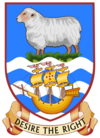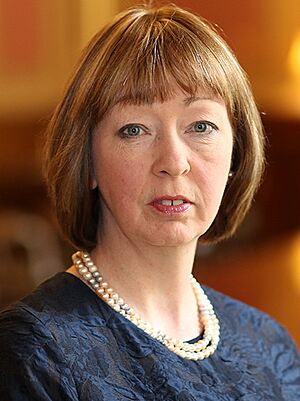Governor of the Falkland Islands facts for kids
Quick facts for kids Governor of the Falkland Islands |
|
|---|---|

Standard of the Governor of the Falkland Islands
|
|

Coat of Arms of the Falkland Islands
|
|
| Viceroy | |
| Style | Her Excellency |
| Residence | Government House, Falkland Islands |
| Appointer | Monarch of the United Kingdom |
| Term length | At His Majesty's pleasure |
| Formation | 1764 |
| First holder | Louis Antoine de Bougainville as Administrator of the French Settlement |
| Website | Office of the Governor |
The Governor of the Falkland Islands is like the King's special representative in the Falkland Islands. They act for the British King or Queen when the monarch isn't there. This means they are the main leader of the islands.
The Governor's job and powers are written down in the Falkland Islands Constitution. This important document explains what the Governor can and cannot do. The Governor lives in a special house called Government House. This building is their official home and office.
Contents
History of the Falkland Islands' Leadership
The story of the leaders on the Falkland Islands is linked to the islands' own past. The very first settlement was at Port St. Louis. It was started by Louis Antoine de Bougainville in 1764. He was the leader of a French group that settled there for three years.
Early Settlements and Changes
In 1766, the first British settlement began at Port Egmont. Its leader was John McBride, a captain from a ship called HMS Jason. The French settlement at Port St. Louis was later given to the Spanish in 1767. They renamed it Puerto Soledad. Felipe Ruíz Puente was the first Spanish military leader there.
The British left many of their overseas settlements in 1776. This was because of the American War of Independence. The Spanish settlement also ended in 1811 due to the Peninsular War.
New Claims and British Return
In 1829, Luis Vernet was named the leader of Puerto Luis (the Falklands). This was done by the United Provinces of South America. The British government did not agree with this. In 1831, Vernet took three US ships. He put their crews in prison for breaking his rules about sealing.
This led to a raid by a US ship called the USS Lexington. Because of this, the United Kingdom sent ships to take back control of the Falkland Islands in 1833. After this, many people from Wales and Scotland came to live on the islands.
The First Governor and Modern Times
The first official Governor of the Falklands was Richard Clement Moody. He was Governor from 1841 to 1848. The title changed from 'lieutenant-governor' to 'governor' in 1843. Moody chose the location for and founded Stanley, the capital city. A place called Moody Brook is named after him.
The British government was in charge until 1982. In that year, Argentina invaded and took over the islands for 74 days. The British Governor, Sir Rex Hunt, was sent away. General Mario Menéndez was then named 'Military Governor' by Argentina.
After Argentina surrendered at the end of the Falklands War, the British Governor returned. It was decided that the government of the Falkland Islands needed to be updated. In 1985, a new Constitution of the Falklands was created. This new constitution gave the Governor less power. It made the Governor more answerable to the Executive Council of the Falkland Islands. It also created a new job called Chief Executive. Many of the Governor's powers were given to this new role. In 2009, an even newer constitution was made. This one further explained the Governor's job and powers.
How the Governor is Chosen and What They Do
The Governor is chosen by the King. The King gets advice from his secretary of state in the United Kingdom. The official appointment is made through a special document from the King.
Executive Power and the Executive Council
Under the Constitution, the King has the main power in the Falkland Islands. The Governor uses this power for the King. Usually, the Governor only uses this power with advice from the Executive Council of the Falkland Islands. This council includes three members chosen by the people in the Legislative Assembly of the Falkland Islands. It also includes the chief executive and the director of finance.
The attorney general and the commander of the British Forces also attend council meetings. They are invited but cannot vote. The Governor also leads these Executive Council meetings.
Governor's Specific Powers
With the Executive Council's advice, the Governor can do many things. They can call a meeting of the Executive Council. They can also end the Legislative Assembly and call a new general election. The Governor can bring back an Assembly that was ended. They give official approval to new laws passed by the Legislative Assembly. The Governor can also stop or bring back a law passed by the Assembly.
The Governor also chooses members for the Advisory Committee on the Prerogative of Mercy. They can remove members after talking with the Legislative Assembly. With advice from this committee, the Governor can forgive people who have committed crimes. They can also change or cancel someone's prison sentence.
When the Governor Can Act Alone
In most cases, the Governor must listen to the Executive Council's advice. However, the Constitution allows for some exceptions. Sometimes, the Governor can choose not to ask for advice, or even go against it. If this happens, the Governor must tell the secretary of state in the United Kingdom why. If they block a law, they need permission from the secretary of state first.
The Governor can act alone if they believe it's best for good governance. This also applies if the advice affects things like foreign affairs, defence, or internal safety (including the police). It also covers justice, money checks, public service jobs, and how public officers are managed. In these situations, the Executive Council members can complain to the secretary of state.
The Governor is also in charge of the defence and internal safety of the Falklands. This is except for police matters. However, the Governor must talk with the commander of the British Forces about these things.
Acting Governor
If the Governor's job is empty, or if the Governor is away or cannot do their duties, an acting governor can be appointed. The King, with advice from his secretary of state, can choose an acting governor. This is allowed under section 24 of the Constitution.
The acting governor must take an oath before starting the job. They have all the same powers and duties as the Governor. They will continue in this role until a new Governor is appointed or the original Governor can return to their duties.
Oath or Affirmation
Before starting their job, the Governor must take two oaths. These are the oath of allegiance and the oath of office. This is stated in section 23(3) of the Constitution. The exact words for the oath of office are in Annex B of the Constitution:
"I, name, do swear (or solemnly affirm) that I will well and truly serve His Majesty King Charles the Third, His Heirs and Successors, and the people of the Falkland Islands, and will uphold the Constitution and other laws in force in the Falkland Islands, in the office of Governor. (So help me God.)"
See also
 In Spanish: Gobernador de las Islas Malvinas para niños
In Spanish: Gobernador de las Islas Malvinas para niños
 | Georgia Louise Harris Brown |
 | Julian Abele |
 | Norma Merrick Sklarek |
 | William Sidney Pittman |


